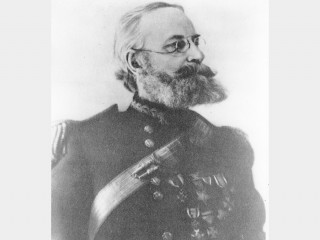
Adolphus Washington Greely biography
Date of birth : 1844-03-24
Date of death : 1935-10-20
Birthplace : Newburyport, Massachusetts
Nationality : American
Category : Arhitecture and Engineering
Last modified : 2010-11-09
Credited as : Arctic explorer and writer, soldier,
Adolphus Washington Greely an American soldier, Arctic explorer, and writer, is remembered for his ill-fated expedition to the Arctic in 1881-1884.
Born in Newburyport, Mass., on March 24, 1844, Adolphus Greely enlisted in the Civil War in 1861, serving valorously. Afterward he joined the U.S. Army Signal Corps, and he directed the erection of military telegraph lines from Texas to California and from the Dakotas to Washington Territory.
A serious student of meteorology, and influenced by a fellow officer's promotion of polar exploration, Greely devoured the literature of the Arctic and determined to lead an expedition there. When Congress, in 1881, authorized American participation in the International Polar Year project to establish numerous circumpolar observation stations, Greely, by virtue of his experience, scientific background, and interest, was chosen to command the U.S. mission.
Greely's party of 25 landed in northern Grinnell Land in August 1881 and established Ft. Conger, sending their ship home. In the next months the expedition's major scientific and exploration objectives were achieved. The outlines of Grinnell Land were fixed; invaluable meteorological, magnetic, biological, and oceanographic records were obtained; and on May 13, 1882, three men from the party reached 83°24'N, a new northing record.
When relief ships failed to return in 1882 and 1883, Greely followed his original orders. He left Ft. Conger, hazardously moving south 200 miles to Cape Sabine, where the party spent the winter of 1883/1884 in unimaginable deprivation. By the time a rescue squadron arrived in June 1884, 18 of the 25 men had perished, one man was dying, and the remaining 6 were near death.
The survivors were at first hailed as heroic explorers. But reckless charges of cannibalism soon leveled against them tainted their lives, even though all evidence strongly suggests their innocence. After Greely recovered his health, he resumed his career in the Signal Corps, advancing to chief signal officer in 1887. He published regional climatology studies between 1881 and 1891 and later built communication lines in Puerto Rico, Cuba, the Philippines, and Alaska.
Retiring in 1908, Gen. Greely devoted himself to study and writing. The story of his expedition had appeared as Three Years of Arctic Service (1886); later works included True Tales of Arctic Heroism (1912), Handbook of Alaska (1925), and The Polar Regions in the 20th Century (1928). A founder of the National Geographic Society, Greely contributed to its magazine and donated his collection of Arctic books and scrapbooks to the society. Honored belatedly by his government, Greely received the Congressional Medal of Honor in 1935, a few months before his death.
Gen. William Mitchell wrote an adulatory biography, General Greely: The Story of a Great American (1936). A thorough and objective account of the Greely expedition is A. L. Todd, Abandoned: The Story of the Greely Arctic Expedition, 1881-1884 (1961). Jeannette Mirsky, To the Arctic! (1948; originally published as To the North, 1934), contains a brief account.
















